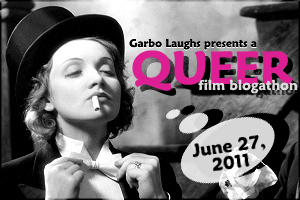There's always an awareness of politics in the selections at True/False. Non-fiction filmmakers are practically the only muckrakers left in a media landscape dominated by corporate control or authoritarian hegemony, so any documentary festival is going to program its share of political fire bombs. The first film I saw at True/False this year was Dirty Wars, one such fire bomb. It seems only fitting to me that the final two films I saw were almost as incendiary.
"Punk was a new music, a new social critique, but most of all it was a new kind of free speech. It inaugurated a moment--a long moment, which still persists--when suddenly countless odd voices, voices no reasonable person could have expected to hear in public, were being heard all over the place: sometimes as monstrous shouts in the marketplace, sometimes as whispers from an alleyway. There was an absolute denial of self-censorship in the Sex Pistols' songs that gave people who heard them permission to speak as freely. If an ugly, hunched-over twenty-year-old could stand up, name himself an antichrist, and make you wonder if it wasn't true, then anything was possible."
--Greil Marcus, from the Introduction to In the Facsist Bathroom
Pussy Riot: A Punk Prayer (2013, directed by Mike Lerner and Maxim Pozdorovkin) is a testament to the still-echoing "no" of punk rock. At its core, punk is a negation, it is standing up to power and to conformity and to social manners and saying, Bartleby-style, "I would prefer not." While that element has been largely tamed in the United States, it still resonates where punk is being newly discovered. Once upon a time, The Clash was "the only band that mattered," both aesthetically and politically, back when they were providing a counter-narrative to Thatcherism and the Reagan revolution by raging against the global hegemony of American media, the conformity of capitalism, the demonization and oppression of the poor and the other, and the imperial state of constant war. They sided with the Sandinistas and were bored with the U.S.A., where "the killers in America work seven days a week." I mourn for Joe Strummer. I really do.
These days, the only band that matters is Pussy Riot, two members of whom are currently in gulag for the crime of raging a punk song at uncomprehending churchgoers in the Orthodox cathedral in Moscow. This stunt--this punk/feminist negation of patriarchy and religion and the troubling alliance of church and state--is reverberating in the world, through Russia and the former republics and beyond. The problem for the Putin administration isn't that what they did was sacrilegious, but that it instead pricked at the confluence of a rising religiosity in Russia with an authoritarian state that is using that religiosity to keep the people docile. Plus, they name names.
The film follows the trial of the three members of Pussy Riot that the authorities were able to identify--the band performs in balaclavas both to hide their identities and to create a uniform identity. The ideology of Pussy Riot is anti-oligarchy, anti-homophobia, anti-Putin, and anti-patriarchy. In this last part, they are the children of the Riot Grrls. Kathleen Hanna would certainly recognize the DIY art-collective aesthetic the band affects. The new wrinkle that Pussy Riot adds is a social media component. They are part of the Tumblr/YouTube generation and they turn social media into a weapon. In past years, the Putin administration might have been able to silence them, but these days? It's all over the internet before the government even knows it's a thing to worry about. If they don't worry about it, I would be shocked. The Arab Spring was fueled by social media, too.
The benefit of this for the filmmakers is that there is plenty of archive footage for them to mix with their interviews with the the families of the women on trial. You get a clear idea of what their stunts look like. I can't say if Pussy Riot is a good band or not from this footage; it's almost beside the point. Punk has never valued any kind of surface craft or even musical ability at all. Punk, as it was for the UK punks of the late 1970s, is a kind of shout at power and nevermind propriety or respect. That shit doesn't wash. In this regard, Pussy Riot is among the purest punk acts ever.
The other side of the table is the church and the state. The prosecutors are offended at the idea that they're stooges of the Putin government. They're just doing their job. And they're probably right. The machineries of authority don't really need minders to grind on. The representatives and defenders of the church, though, probably would have done well to stay the hell off camera because they come off as exactly the ignorant patriarchal assholes that Pussy Riot paints them as. With every pronouncement--that Nadia, who they see as the leader of the band, is actually a demon, for instance--they invite the audience to wonder exactly what century they think they live in. This is an instrumentality of the power of old white bigoted men, and from my point of view, they're more butthurt that uppity women might rise to challenge them than any deep offense at alleged sacrilege. Sacrilege is a pretext. The funniest part of the movie is watching them stumble over how to translate the name of the band.
Meanwhile, social media works its magic and the Putin government looks worse and worse as it prosecutes Pussy Riot. When one member of the band finds a loophole in her defense and gets herself released, you can almost feel the relief from the prosecution. One less problem. I'm sure they'd like it all just to go away. I doubt that Pussy Riot will let that happen.
A different kind of "no" shouted at power is found in the aptly titled No (2012, directed by Pablo Larraín), an account of the overthrow of the Pinochet regime in Chile in 1988, which is still the only dictator in history overthrown by a popular vote. The story goes something like this: feeling the heat of international pressure over the brutality of his regime, General Pinochet agreed to stage a plebiscite to legitimize his hold on the country. It was a simple question: "Yes," would mean Pinochet stayed, "No" would mean he would step down. Or not. No one thought it would be that easy. Certainly, Pinochet's minions would rig the election and there would be no possibility of the "no" votes winning, right? Therein lies the drama and the lesson for history. The key was media. The "no" campaign was allotted fifteen minutes of television time every night during the campaign to make their case, the first time in fifteen years that dissent was heard in the Chilean media.
This is a hybrid film. It's a fictionalized account of real events, but over a third of the film is composed of archival materials. More than that, many of the people involved in the "No" campaign are in the film playing themselves in a fit of Kairostami-an metacinema. For reasons that should be obvious, the people involved in the "Si!" campaign are not playing themselves in the film. Further, the filmmakers have chosen to shoot the film on the kinds of video cameras that were used on the original campaign back in 1989, in the 4:3 aspect ratio of television, thus creating a seamless transition from the image quality of their archival material and their new footage. It's a clever conceit. It gives the movie a kind of washed-out video quality to it. Sometimes it's quite beautiful. Sometimes it's like watching an old home movie from the 1980s. It's mostly seamless.
The central figure in the narrative is René Saavedra (Gael Garcia Bernal), an advertising executive who is approached by the "No" campaign to design their media. He has a hard row with this employers, both the "No" campaign and his right-wing superior at his day job. With the "No" campaign, his client wants to express their outrage and air their grievances. Saavedra knows full well that if you put a bunch of horror on television, you won't sway a single vote. Instead, he adopts the techniques of advertising, selling the "No" option like it's a soft drink. Saavedra is selling a happy future rather than the recriminations of the past. Unfortunately for him, his clients hold some serious grudges. As it becomes clear that Saavedra's campaign is a serious threat, Pinochet's people hire Saavedra's boss to counter him, but, of course, they've already lost by then. Their attempts at response are pathetically derivative. They've ceded the ground and let the "No" campaign dictate the terms of engagement. It's telling that when they search for talent to work on the "Si!" campaign, they discover that all of the artists in Santiago have already joined the "No" campaign. Artists do so hate censorship. The only thing for it is to terrorize the "No" people and Saavedra in particular with a series of dirty tricks and ominous intimidation.
Saavedra is fictional. He's an amalgam of two men (who appear in the movie as masterminds of the "Si" campaign). He functions as a point of view character, but they've given him a dramatic arc. Saavedra's ex-wife is a leftist who suffers occasional intimidation from the police. They bicker over their son. Saavedra wants to get back together. She doesn't. She's got another man. As personal narratives set against historical events, this isn't bad. The leftist ex who is disappointed in him provides a nice foil for Saavedra's political awakening. At first, he doesn't want to do the campaign, and when he does take it on, no one has faith in his approach. Not serious enough. It's fun watching him bristle with the seriousness of the left. The left has always dealt in depressing realities. The kind of fantasy Saavedra concocts is usually the domain of right wing propaganda, but he understands that voters are wooed by fantasy more than facts. Even in dictatorships. The similarity to elements of the "No" campaign to the campaign of Barack Obama is probably not coincidental. The way the right reacts to the "No" campaign's use of a rainbow as an icon is telling: "I thought that was the symbol of fags?" says one of them. "Communist fags?" I can imagine that exchange in contemporary Yankee politics, actually. It's no more ridiculous than the "terrorist fist bump."
Most political movies are dark, but this one isn't. It has a happy ending. Pinochet was overthrown. Saavedra goes back to selling soap operas and soda pop after he changes the world. He even reconciles with his rabidly right-wing boss. There's hope for the future in this movie, and I'm kind of relieved that this was the last film I saw at True/False. It's a good way to end the festival.




















No comments:
Post a Comment